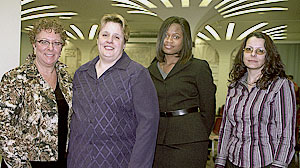|
|
Campus News
IFW "Was There like an
Angel" for UAlbany Doctoral Student
 |
|
From
left, Nancy Belowich-Negron, Pauline
Bush, Debernee Pugh, and Carmen Caamaño
spoke recently about how significant
winning an IFW award was to them.
|
By Greta Petry (April
8, 2005)
Nancy Belowich-Negron, director of Disabled
Student Services, recalled the power of what
an Initiatives For Women (IFW) grant can do,
at the March 10 Winter Forum.
With her first award in 1995, Belowich-Negron
took a graduate student with her to a federally
funded program in Minneapolis, where they were
teaching leadership skills to students with
disabilities.
The student, Michelle Macalalad, was a quiet,
physically frail young woman who was suffering
from a brain tumor. After the conference was
over, the plane leaving Minneapolis was grounded
for two hours. When the plane finally took
off and arrived at Chicago's O'Hare
Airport, passengers learned the flight was
grounded again because of thunder, lightning,
and hail.
"There were about two million people
standing around the airport, and all the flights
were cancelled," Belowich-Negron said.
They were told to sleep in the airport. At
this point, Belowich-Negron grew concerned,
because Michelle was prone to seizures, and
all her medication was on the plane.
But Michelle, having just taken the leadership
course, took charge.
"She went to the front of the line
and said, ‘I need help,' to total
strangers. She took control of our situation.
I will always be grateful to IFW for that," said
Belowich-Negron. "I was just blessed
to have that week with Michelle, who later
passed away."
Belowich-Negron's second grant from
IFW "enabled me to do something which
truly changed the course of my life." That
grant was used to pursue National Coalition
Building Institute training. Belowich-Negron
also pointed out that every year a disabled
student has been included in the IFW awards,
and that more than $8,000 has gone to disabled
students since the first awards were given
out in 1994.
Like Belowich-Negron, each of the four panelists
at the Winter Forum had a story to tell about
how IFW assistance had gotten them over a hurdle
that stood in the way of their education.
Carmen Caamaño, a doctoral student in the
Department of Latin American and Caribbean
Studies, said, "IFW came when I didn't
have any more funding. IFW came like an angel." Caamaño, a past recipient of the Christine E. Bose
and Edna Acosta-Belen IFW Feminist Research
Award, is focusing on cultural changes and
labor migrations of Costa Ricans to the United
States in her dissertation.
"If you have no money to start your
research, you can't continue your career," said
Caamaño. Then students are forced to find
other ways to make money, which takes time
away from their research.
"IFW just saved my life," Caamaño said. Later, during a question-and-answer
period, Caamaño said that while she is single,
many of her female colleagues are married and
have children. "Most women have to deal
with all the guilt of leaving their family" to
pursue their education, she said. She sees
them around campus, constantly on the cell
phone, checking in with the sitter. Then they
will compare themselves to her and admire how
quickly she is accomplishing her goals. "But
I don't have to pick up the children
from school and make the dinner," she
said.
Pauline Bush, an undergraduate sociology
major and 2001 Avon Life Impact Scholarship
award recipient, said she is grateful for the
help of IFW, as well as that of many "wonderful
people," including Katharine Briar-Lawson,
dean of the School of Social Welfare, and Kathy
Turek, former chair of IFW.
"I am just so grateful to all of you," said
Bush, who said staying in school has taken
extra support while she battles chronic fatigue
syndrome.
Debernee Pugh, a doctoral student in the
School of Criminal Justice, a residence hall
director, and a 2004 IFW President's
Award recipient, said other students and staff
should apply for IFW awards. "I encourage
you to go for it," Pugh said. "If
you don't get it, you don't. You
have nothing to lose, only everything to gain."
Belowich-Negron said the IFW application
is user friendly and the skills learned in
the process can be applied to writing other
grants. "Do you have an idea? Is it fundable?
How do you evaluate it?" she said.
Event chair Rosann Santos moderated the panel
and organized the Winter Forum event. She noted
the Mother's Day fund-raising campaign
runs through May 1. In addition, IFW is seeking
walkers and sponsors for the June 4 Freihofer's
Walk/Run for Women, and the Summer Celebration
will be July 21. In the fall, there will be a
new fall fund-raising event for IFW, a celebration
of women's talents. Possibilities include
singing, a dance troupe, and poetry.
|
|
